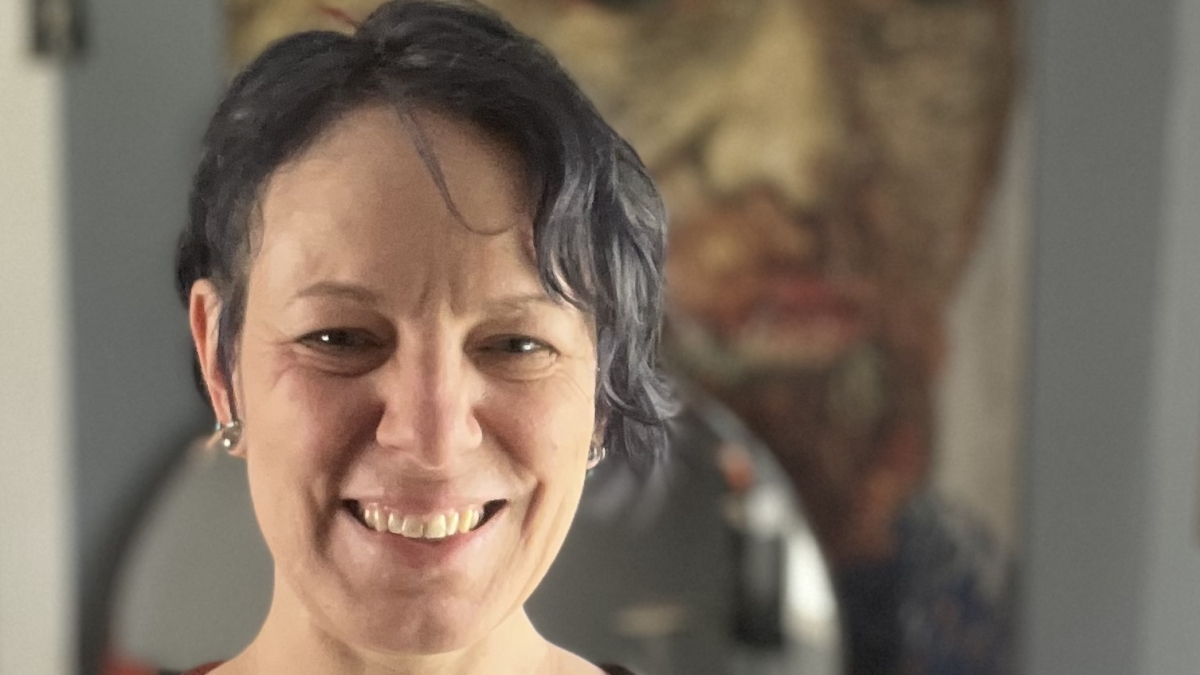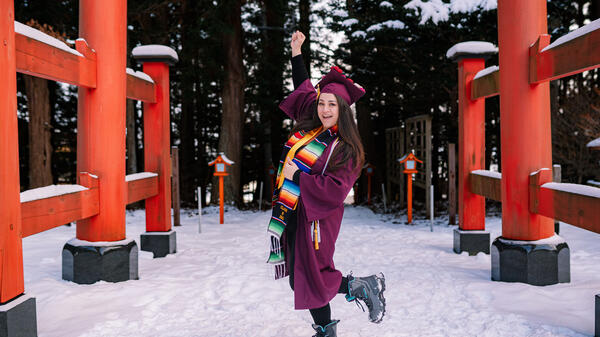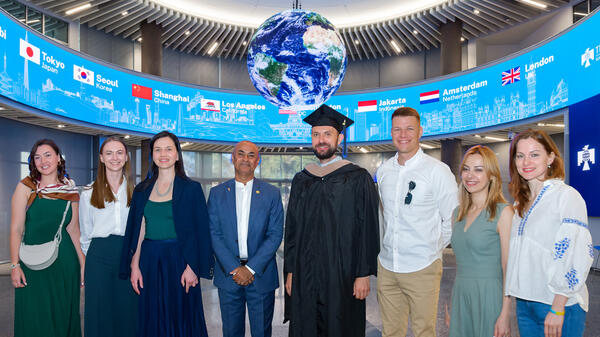Grad completes inaugural complex adaptive systems science degree program

Tanya Bils, spring 2024 Outstanding Graduate. Courtesy photo
Editor’s note: This story is part of a series of profiles of notable spring 2024 graduates.
Tanya Bils, a graduate of the inaugural master’s degree program in complex adaptive systems science, offered through the School of Complex Adaptive Systems and ASU Online, was named the outstanding graduate student for the Arizona State University College of Global Futures.
Bils said that their biggest hurdles in pursuing a master’s degree were internal. They felt that they had to challenge the expectations of what their life “should” look like versus what they wanted it to look like. However, they had a great support system in their family.
“It was my children who fed back to me many of the things I told them, and the messages I tried to share with them as they were growing up,” they said, “like how you are the one who sets most of the limitations on yourself. They reminded me quite often that being fearful is an indication of your great interest in something.”
Feeling welcomed at ASU made the process easier, and Bils emphasized that from their first conversation with Michael Barton, director of education for the School of Complex Adaptive Systems, they knew they could be successful at ASU.
“Dr. Barton talks about complex systems in such an accessible way. I spoke to him on the phone several times before I enrolled, and I also watched some of his videos,” Bils said. “I knew after speaking to him that I needed to come out here and complete this program.”
During their program, Bils investigated transportation systems through a complexity lens, exploring different modes of transportation, how they interact and how engineering, design and the built environment can create more accessible, livable cities. There was also a psychological component to their research — the science behind decision-making.
“One of the things I’ve noticed is that there’s a lot of cognitive dissonance in people who do not choose to take a bus, or a bike or a scooter. They do want to have livable, walkable cities but they also don’t personally want to give up the choices they’ve already made,” Bils said.
Their research showed that small changes can help.
“Sometimes, when you can get someone thinking about how they can support others to make those choices, they begin to shift that narrative in their own mind. They can start to see themselves making that choice,” they said.
Bils currently works for the Center for Urban and Regional Analysis at Ohio State University. After graduation, they are looking forward to continuing their education at ASU and will be pursuing a PhD in complex adaptive systems science this upcoming fall.
“My next big step is to keep studying and to develop my education to the point where I can make an even bigger impact on the world,” they said. “When I started this, I made a list of all the things I would do if I didn’t think there were any limits on myself. I found out that I want to change the world. I used to be afraid of saying things like that, but I want to make the world a better place.”
We spoke with the new graduate to learn more about their experience at ASU.
Question: What was your “aha” moment when you realized you wanted to study the field you majored in?
Answer: During my baccalaureate studies in GIS, statistics and city planning at Ohio State, the traditional methods I was learning at the time felt limiting. This prompted my explorations into complexity science. In my final year, three of my classes simultaneously introduced me to complexity as a field. This framework resonated with me — embracing dynamic interactions and feedbacks in systems of interdependent components and taking a holistic approach to understanding emergent patterns. Shifting away from viewing components in isolation seemed like a better approach and I LOVED working with coding agent-based models.
I started reading all I could about complexity. I read Strogatz, Hofstadter, Batty. I started digging into possible master's programs that had agent-based modeling courses and followed the breadcrumbs to the Santa Fe Institute, which lead me to ASU and to Dr. Barton’s work in ABM and GIS. He helped me see that this was a path I could follow.
Q: What’s something you learned while at ASU — in the classroom or otherwise — that surprised you or changed your perspective?
A: I had struggled for some time to make sense of principal component analysis. I understood how, but had no confidence that I understood the why. In my dimensionality reduction class with Professor Brian Daniels, everything just clicked. This was definitely a moment where I felt clear that I was in the right place doing the right things.
Q: Why did you choose ASU?
A: ASU has the only program I could find in complex adaptive systems that truly brought together an interdisciplinary faculty. ASU created an accessible program to propel me along a path I hadn’t even been able to see before (and) made a murky vision become clear.
Q: Which professor taught you the most important lesson while at ASU?
A: Professor Sha Xin Wei helped me expand my perspective and integrate my data-focused thinking with deeper philosophical understandings of the place human-driven systems occupy within a larger evolving socioecological-technical system and the value of an interdisciplinary framework that incorporates the humanities into the work of STEM research.
Q: What’s the best piece of advice you’d give to those still in school?
A: It’s hard not to focus solely on metrics. Often when we do this, it gets in the way of learning. Don’t focus on the “right” answer ... but take risks, ask the questions you are afraid to ask, reflect on how the coursework is incorporated into your knowledge. This understanding will create value for you years from now. Put in your best effort, work to develop and grow, honestly engage with the material in your classes and let the outcomes be what they are. Whenever I’ve let anxiety about a grade lead my thinking, it’s shut down my ability to truly think. Whenever I forget to not say something silly or "wrong," I have a much more fulfilling outcome.
Q: What was your favorite spot for studying?
A: I’ve learned to love working in a coffee shop, and I really value the occasional friendly Zoom chat with class friends where we can just talk and not be so intently focused on outcomes.
Q: If someone gave you $40 million to solve one problem on our planet, what would you tackle?
A: First, I would ask for 10 times that amount, as $40 million won’t solve any global problems on its own. I think it’s also important to acknowledge that single-point solutions often create a multitude of unintended consequences. I would want to apply any funding available to localized projects that have the potential to act as a catalyst for other improved outcomes across the region. This could look like identifying an impoverished locality where a small-scale clean water initiative utilizing renewable energy sources would be co-designed with the community, leading to improved health and available energy resources and perhaps becoming a model for replication in other areas.
More Sun Devil community

ASU Online alumna overcomes adversity, becomes advocate for military families
Editor's note: Arizona State University alumni are making a difference in every corner and community of the world, positively changing the lives of those they encounter. For National Military…

ASU's Earned Admission program paves the way for second chances
Over the past few weeks, students across the nation celebrated significant milestones — National College Decision Day and commencement, for example. But not everyone gets to make a decision to go to…

Inaugural cohort from Ukraine graduates with dual degrees during wartime
The American University Kyiv opened its doors in February 2022, just three weeks before Russia's invasion of Ukraine. Despite the tremendous challenges that followed, the school and its students…